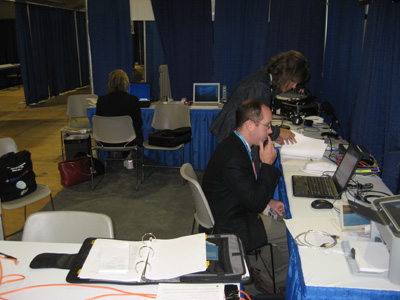
(It’s a 4:30 a.m. wake-up call for MPR’s Midmorning staff. Producers Nancy Lebens and Chris Dall prepare for today’s show hours before broadcast time. Kerri Miller is working in the background)
I’m live-blogging Midmorning today from (9-9:45 a.m. CT). We’re talking about the youth vote and we’d like to put your views on the air. During the session on election reform the other day, it was fascinating how much of the effort is tied to the young voter. Why? Because the young voter isn’t as committed to voting, according to research. They’re impatient, they move faster in the world, and if the voting process doesn’t go smoothly, they’ll move on and go do something else.
And yet, the political parties are courting the youth vote.
If you have a view to share with the world, type it up below. Because Midmorning this week is being broadcast in several markets, it would be great if you’d indicate where you’re from.
Our guests are: Molly Andolina, associate professor of political science at DePaul University; Robert Biko Baker, executive director of the League of Young Voters;
Justin Rockefeller, political activist, and co-founder and National Program Director of Generation Engage; and you.
9:05 a.m. – I’m listening to Kerri and the guests talking off-air. “How long are we on for?” one of the guests asks. “About 40 minutes,” Kerri says. “Wow! Thorough,” came the reply.
9:10 a.m. – Justin says “this time around is different” regarding the youth voter. We were told it would make a difference in ’04; it didn’t. He says New York is one of the places where it’s difficult to get young people to turn out.
Minnesota is one of the places where young people do turn out. Baker says same-day registration is one of the reasons for that.
Molly Andolina says young people have never turned out since 1972 (that would be me!). Young people are more likely to move around, and less likely to be involved in their communities. The gap in voter participation between young people and old people grew widest for Generation X in the ’80s but they closed the gap in ’04.
9:15 a.m. Good comments already. Social networking is the way to ground young people into the community. So that has to show up this year at the polls if true, right? I was walking down the street yesterday marveling at all of the people who were disengaged from where they were. They were all texting or on the phone. Maybe a young person’s definition of community isn’t geographic. Maybe their community is their “friends on the other end of the message.”
9:17 a.m. – Baker says peer-to-peer networking is the best way to increase voter participation. “We sent African Americans into Latino neighborhoods and it didn’t work,” he said.
“This generation needs authenticity; they’ve been marketed to since birth. They don’t want a politician or a musical person telling them who to vote for,” Andolina says.
9:21 – Krissy from New York City says, “you know how you can put signs in your yard? They have the same thing on Facebook and everytime your friend joins a group, a sign pops up that says ‘your friend is supporting Obama.’
“It works,” Baker says. “This is the 21st century and the tools we use right now are going to be used for the next 20-30 years.”
9:23 a.m. – Rockefeller says face-to-face is still going to be important, “because young people want to get out and socialize.”
9:25 a.m. – Andolina says the current generation is more willing to sacrifice and represents the new “greatest generation.” We’ve got to discussion that. Where’s the evidence that the young generation is willing to sacrifice to the degree that the World War II generation did, as Andolina seemed to suggest?
9:28 a.m. – Rockefeller says the war is “not in the abstract” for young people and remains an issue. Biko Baker says the economy and college debt (he has $140,000 in college debt.Is that usual?) are main issues.
9:35 a.m. – “This generation volunteers more than any previous generation,” Rockefeller says. I need to start seeing some data on some of these generational comparisons.
9:37 a.m. – I want to go back to something Andolina said. “Authenticity.” There’s almost nothing authentic about politics. This convention is a perfect example. Maybe one of the reasons young people don’t engage more, is that they think politics is fake. Comments?
9:42 a.m. – A good exchange between a caller and Rockefeller. “Obama looks like change, but is he change?” The caller, a 16 year old, says she’s seeing much more interest in school in politics than before.
9:44 a.m. – Here’s a link that a guest just mentioned. Generation Vote.
Here’s the link for Generation Engage.
